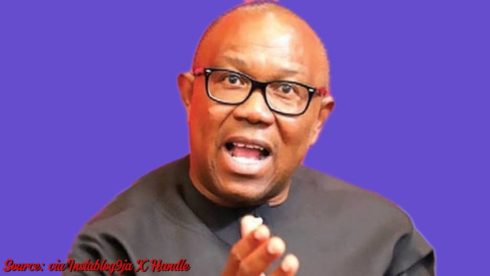Nigerian politician and former governor of Anambra State, Peter Obi, has strongly criticized the country’s leadership across various sectors, describing the recent failure at the Olympics as a clear example of “recklessness and rascality”. Obi expressed his disappointment and frustration with the poor performance of Nigerian athletes at the international sporting event, stating that it reflects a broader problem of ineffective leadership and poor governance in the country.
Peter Obi argued that the failure of Nigerian athletes at the Olympics is not just a result of poor sports management, but also a symptom of a larger issue of recklessness and rascality in leadership across various sectors, including education, healthcare, and economy. He emphasized that the country’s leaders have failed to provide the necessary support and resources for athletes to excel, and that this failure is reflective of a broader pattern of neglect and incompetence.
Nigeria’s Olympic Failure: A Symptom of Deeper Issues
Peter Obi’s comments come as Nigeria’s Olympic team returned home without a single medal, despite high hopes and expectations. The poor performance has sparked widespread criticism and disappointment, with many calling for reforms in the country’s sports management and leadership. Peter Obi’s statement highlights the need for a more comprehensive approach to addressing the country’s challenges, beyond just sports management.
The former governor’s critique extends to other areas, such as education and healthcare, where he argues that the country’s leaders have failed to invest in critical infrastructure and human capital. Peter Obi’s comments have resonated with many Nigerians, who are calling for greater accountability and effective leadership to address the country’s myriad challenges.
Leadership Recklessness: A Threat to Nigeria’s Progress
Peter Obi’s statement has sparked a wider conversation about the impact of leadership recklessness on Nigeria’s progress. Many have argued that the country’s leaders have prioritized personal interests over national development, leading to widespread corruption, mismanagement, and incompetence. The Olympic failure is seen as just one example of the consequences of this recklessness.
As Nigeria continues to grapple with its challenges, Peter Obi’s comments serve as a call to action for leaders to take responsibility and work towards meaningful reforms. The country’s citizens are demanding greater accountability and effective leadership to address the nation’s problems and ensure a brighter future.
Peter Obi’s Call for Action: Reforms and Accountability
Peter Obi’s statement is a clarion call for reforms and accountability in Nigeria’s leadership. He has emphasized the need for a fundamental transformation in the country’s approach to governance, sports management, and human capital development. Obi’s comments have resonated with many Nigerians, who are calling for greater transparency, accountability, and effective leadership.
As the country moves forward, Peter Obi’s call for action serves as a reminder of the urgent need for reforms and accountability in Nigeria’s leadership. The Olympic failure is just one example of the consequences of leadership recklessness, and it is imperative that the country’s leaders take responsibility and work towards meaningful change.
The Future of Nigeria Hangs in the Balance: A Call for Leadership Reforms
Nigeria’s future prosperity and growth depend on its leaders’ willingness to take responsibility and implement meaningful reforms. Peter Obi’s statement highlights the urgent need for accountability and effective leadership in the country. As Nigerians demand greater transparency and accountability, leaders must respond with tangible actions to address the country’s challenges. The recent Olympic failure serves as a stark reminder of the consequences of leadership recklessness and the need for a comprehensive approach to reform.
With the right leadership and reforms, Nigeria can overcome its challenges and achieve its full potential. It is imperative that leaders reassess their priorities and work towards a more inclusive and sustainable development strategy. By doing so, Nigeria can unlock its vast potential and become a beacon of hope for generations to come. The time for meaningful action is now, and Nigerians are eagerly awaiting their leaders’ response to the call for reforms. Will Nigeria’s leaders rise to the challenge and shape a brighter future for the country? Only time will tell.
Table of Contents
Discover more from OGM News NG
Subscribe to get the latest posts sent to your email.














